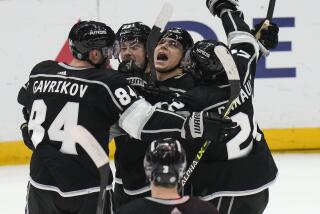Blues’ Martin Emerging From Demers’ Shadow
- Share via
ST. LOUIS — Slowly but surely, Jacques Martin is stepping out of the giant shadow cast by former St. Louis Blues coach Jacques Demers.
The introspective Martin had a hard act to follow in succeeding the enthusiastic Demers. Many St. Louis sportswriters referred to him as Jacques II.
Martin took a long step toward eclipsing Demers when the Blues won the Norris Division title in the last game of the year -- a 3-2 overtime victory over the Detroit Red Wings, now coached by Demers.
The game was televised in St. Louis and the cameras were tightly focused on Martin after the game. He broke his normal serious expression into one of joy. Martin smiled, laughed and pumped the hand and slapped the back of each player going off the ice.
“That certainly was nice,” said Martin, “but it’s in the past. Sunday night is one I won’t forget. But that was last season. We’ve got the playoffs now and that’s the season the fans remember.”
In last year’s Cinderella season, Demers just missed leading the Blues to the Stanley Cup finals. Calgary stopped St. Louis with a 2-1 victory in the seventh game of the conference championship.
The dynamic and colorful personality of Demers helped him become a popular figure in St. Louis, a town known for baseball instead of hockey.
But Demers became bitter at former owner Harry Ornest and bolted the Blues for the Detroit Red Wings and a hefty pay increase.
Enter the quiet, soft-spoken 34-year-old Martin. He was fresh from guiding the Guelph Platers to the Memorial Cup title in junior hockey.
“It was a great opportunity to coach the Blues,” Martin said. “Here was a good team and a good organization. It was my chance.”
The players like Martin.
“He’s very reserved, very relaxed,” said defenseman Jim Pavese. “What’s impressive is he’s always in control of things.”
Blues captain Brian Sutter agreed.
“Jacques is so perceptive,” Sutter said. “He picks up on things during a game and between periods, he relays them to us and we adjust. He’s very good at that.”
Martin did not believe he took too big a step in moving to the NHL. He adapted to the Blues gradually, setting goals of building consistent, effective, powerful special teams. That worked out. The Blues finished the season with the sixth-best power play and the second-best penalty-killing unit.
However, his rookie campaign started poorly.
In training camp, 25-goal scorer Eddy Beers was lost for the season because of a back injury. Soon after the season began, Sutter was knocked out for the year by reinjuring the shoulder he hurt last season.
Then top defenseman Rob Ramage missed more than 25 games with a tender knee and high-scoring center Bernie Federko suffered a broken jaw in a freak game accident and missed six weeks.
“We had some tough times,” Martin said. “I didn’t get discouraged. Injuries are a part of the game but we lost some very key components. We had some other guys rise up and play some very good hockey for us.”
Martin singled out Doug Gilmour, who became the second player in St. Louis history, besides Federko, to score more than 100 points. Gilmour ended the regular season with 105 points.
“We gave him the opportunity to be an offensive player and he responded,” Martin said.
Despite the offensive display by Gilmour and the return of Federko and Ramage, it appeared the Blues might miss the playoffs with three weeks left in the season. Then St. Louis put on a spirited charge that ended with the division title.
“I’ve got a good group of players here,” Martin said. “They are leaders. You have to have those types of players on a hockey team if you’re going to be successful. I feel fortunate. I’ve had a good first year here. We’re doing a good job here. I’m satisfied and pleased with the players.”
More to Read
Go beyond the scoreboard
Get the latest on L.A.'s teams in the daily Sports Report newsletter.
You may occasionally receive promotional content from the Los Angeles Times.






